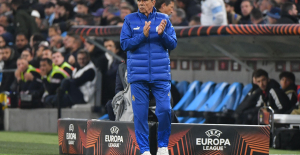Gang Chen case: The department made its decision in a single-page file in Boston federal court, stating that it was unable to meet its burden of proof.
Rachael Rollins (the top federal prosecutor in Massachusetts), said that the move was in the "interests of justice" and was based on new information received by the government about the allegations.
Rollins stated that after examining the new information within the context of all evidence, the office concluded that it could no longer fulfill its burden of proof at trial. "As prosecutors we have an obligation in all matters we pursue to continue to examine the facts and be open to receiving new information."
This is the result that was expected and had been recommended earlier by Boston prosecutors. It also marks a setback to the China Initiative, a Justice Department initiative created in 2018 to combat Chinese economic espionage.
The initiative's main prong has been focused on U.S. academics who are accused of hiding research ties with China in grant applications. However, critics claim it has unfairly targeted ethnicity-based researchers.
Wyn Hornbuckle, spokesperson for the Justice Department, stated that the Justice Department is currently looking at the future of this program. This process should be completed in the next few weeks.
Chen, a professor of mechanical engineering at MIT was arrested during the Trump administration's final days. He was charged with concealing ties between Beijing and collecting U.S. Dollars for his research in nanotechnology.
Prosecutors alleged that he entered into undisclosed appointments and contracts with Chinese entities. He also acted as an "overseas specialist" for the Chinese government upon request of the People's Republic of China Consulate Office, New York.
Authorities stated in court documents that many of these roles were "expressly intended for the advancement of the PRC's scientific-technical goals."
Chen was accused of not disclosing information regarding China connections in an Energy Department grant application. Chen's lawyers maintained that he was innocent and disclosed only what was necessary.
As the government received more information, including from Energy Department, the case started to unravel, according to a source familiar with the matter.
Robert Fisher, the defense attorney, said Thursday that the case was a "wayward prosecution" but that his client was eager for a return to work. He thanked "many witnesses" who spoke out to tell the government how they misunderstood details about scientific and academic collaboration.
"Our defense was that Gang didn't commit any of these offenses. It's that simple. He never participated in talent programs. He was not an outgoing scientist for Beijing. Fisher stated in a statement that he disclosed all he was required to disclose and never lied to anyone.
Most of the China Initiative cases involving professors were based on allegations of grant fraud, rather than accusations that researchers tried to pass on academic studies or secrets to China.
Last month, the Harvard University professor was convicted of hiding his connections to a Chinese-run recruitment agency. This was a major victory for the initiative.
Other cases that were brought in as part of China Initiative have also failed.
In September, a federal judge dismissed all charges against a University of Tennessee professor who was accused of concealing his relationship to a Chinese university and receiving research grants from NASA. The university offered to reinstate him.
Critics of China Initiative called on the Justice Department for the program's termination. Matthew Olsen (the top official in national security at the department) met Wednesday with members from the Congressional Asian Pacific American Caucus to discuss their concerns.
Andrew Lelling was the U.S. Attorney in Boston at Chen's trial and wrote several weeks ago in a LinkedIn posting that the "initiative had drifted" and lost its focus. DOJ should restructure and close down certain parts of the program to prevent unnecessary chilling of scientific and business collaborations between Chinese partners.

 Sydney: Assyrian bishop stabbed, conservative TikToker outspoken on Islam
Sydney: Assyrian bishop stabbed, conservative TikToker outspoken on Islam Torrential rains in Dubai: “The event is so intense that we cannot find analogues in our databases”
Torrential rains in Dubai: “The event is so intense that we cannot find analogues in our databases” Rishi Sunak wants a tobacco-free UK
Rishi Sunak wants a tobacco-free UK In Africa, the number of millionaires will boom over the next ten years
In Africa, the number of millionaires will boom over the next ten years Can relaxation, sophrology and meditation help with insomnia?
Can relaxation, sophrology and meditation help with insomnia? WHO concerned about spread of H5N1 avian flu to new species, including humans
WHO concerned about spread of H5N1 avian flu to new species, including humans New generation mosquito nets prove much more effective against malaria
New generation mosquito nets prove much more effective against malaria Covid-19: everything you need to know about the new vaccination campaign which is starting
Covid-19: everything you need to know about the new vaccination campaign which is starting For the Olympics, SNCF is developing an instant translation application
For the Olympics, SNCF is developing an instant translation application La Poste deploys mobile post office trucks in 5 rural departments
La Poste deploys mobile post office trucks in 5 rural departments Meta accelerates into generative artificial intelligence with Llama 3
Meta accelerates into generative artificial intelligence with Llama 3 In China, Apple forced to withdraw WhatsApp and Threads applications at the request of the authorities
In China, Apple forced to withdraw WhatsApp and Threads applications at the request of the authorities The main facade of the old Copenhagen Stock Exchange collapsed, two days after the fire started
The main facade of the old Copenhagen Stock Exchange collapsed, two days after the fire started Alain Delon decorated by Ukraine for his support in the conflict against Russia
Alain Delon decorated by Ukraine for his support in the conflict against Russia Who’s Who launches the first edition of its literary prize
Who’s Who launches the first edition of its literary prize Sylvain Amic appointed to the Musée d’Orsay to replace Christophe Leribault
Sylvain Amic appointed to the Musée d’Orsay to replace Christophe Leribault Skoda Kodiaq 2024: a 'beast' plug-in hybrid SUV
Skoda Kodiaq 2024: a 'beast' plug-in hybrid SUV Tesla launches a new Model Y with 600 km of autonomy at a "more accessible price"
Tesla launches a new Model Y with 600 km of autonomy at a "more accessible price" The 10 best-selling cars in March 2024 in Spain: sales fall due to Easter
The 10 best-selling cars in March 2024 in Spain: sales fall due to Easter A private jet company buys more than 100 flying cars
A private jet company buys more than 100 flying cars This is how housing prices have changed in Spain in the last decade
This is how housing prices have changed in Spain in the last decade The home mortgage firm drops 10% in January and interest soars to 3.46%
The home mortgage firm drops 10% in January and interest soars to 3.46% The jewel of the Rocío de Nagüeles urbanization: a dream villa in Marbella
The jewel of the Rocío de Nagüeles urbanization: a dream villa in Marbella Rental prices grow by 7.3% in February: where does it go up and where does it go down?
Rental prices grow by 7.3% in February: where does it go up and where does it go down? With the promise of a “real burst of authority”, Gabriel Attal provokes the ire of the opposition
With the promise of a “real burst of authority”, Gabriel Attal provokes the ire of the opposition Europeans: the schedule of debates to follow between now and June 9
Europeans: the schedule of debates to follow between now and June 9 Europeans: “In France, there is a left and there is a right,” assures Bellamy
Europeans: “In France, there is a left and there is a right,” assures Bellamy During the night of the economy, the right points out the budgetary flaws of the macronie
During the night of the economy, the right points out the budgetary flaws of the macronie These French cities that will boycott the World Cup in Qatar
These French cities that will boycott the World Cup in Qatar Europa League: “We dream of everything,” says Jean-Louis Gasset
Europa League: “We dream of everything,” says Jean-Louis Gasset Europa League: “Trouble playing our football,” admits Benfica coach
Europa League: “Trouble playing our football,” admits Benfica coach Europa League Conference: “Martinez eats all your deaths”, Obraniak’s breakdown after the elimination of Lille
Europa League Conference: “Martinez eats all your deaths”, Obraniak’s breakdown after the elimination of Lille Premier League: “It’s a team that is transforming into the Champions League”, Casemiro returned to Real’s qualification
Premier League: “It’s a team that is transforming into the Champions League”, Casemiro returned to Real’s qualification


















